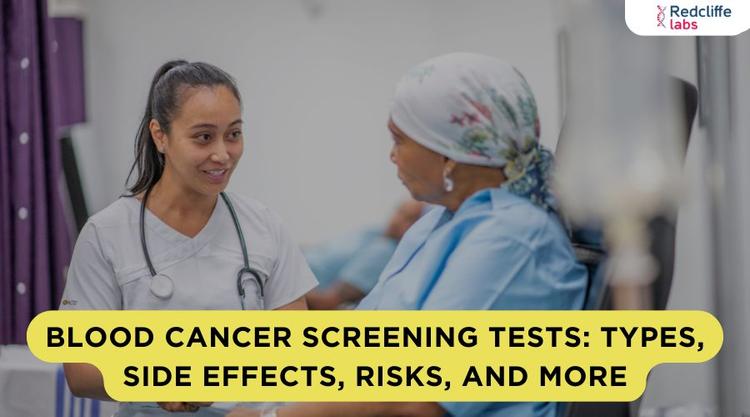What Are Thyroid Cancer Symptoms in Females?

Medically Reviewed By
Dr. Ragiinii Sharma
Written By Kirti Saxena
on Aug 31, 2023
Last Edit Made By Kirti Saxena
on Jan 7, 2025

Thyroid cancer is the seventh most common cancer in women. The chances of women having thyroid cancer are three times higher than men. While thyroid cancer can affect people of all ages, it is more commonly diagnosed in people between 25 and 65. Thyroid cancer can affect both males and females, but it is more common in females. Thyroid cancer is a type of cancer that develops in the cells of the thyroid gland, a small butterfly-shaped gland located in the front of the neck. The thyroid gland produces hormones that regulate metabolism and other important bodily functions. Thyroid cancer occurs when the cells in the thyroid gland grow uncontrollably and form a tumor. The main hormones produced by the thyroid gland are thyroxine (T4) and triiodothyronine (T3), collectively referred to as thyroid hormones. This blog will discuss the symptoms, causes, and types of female thyroid cancer.
How Common Is Thyroid Cancer In Women?
Thyroid cancer is more common in women than in men. The gender difference in thyroid cancer incidence is quite significant. Thyroid cancer is one of the most common cancers among women. It ranks as the seventh most common cancer in women globally, accounting for a significant proportion of all cancer cases. Thyroid cancer is approximately three times more common in women than in men. This means that about three women are diagnosed with thyroid cancer.
The higher cases of thyroid cancer in women are observed across various types, including papillary, follicular, and medullary thyroid cancer. The increased incidence of thyroid cancer in women has led researchers to investigate the role of hormones, particularly estrogen, in developing thyroid cancer. Estrogen receptors are present in thyroid tissue, and some studies suggest that estrogen might influence the growth and progression of thyroid cancer cells.
Common Symptoms Of Thyroid Cancer In Females
Thyroid cancer often does not show any noticeable symptoms in the early stages. However, as the cancer grows, it offers various symptoms, including:
- Neck Lump or Nodule
- Hoarseness or Voice Changes
- Difficulty Swallowing (Dysphagia)
- Pain in the Neck or Throat
- Swollen lymph nodes
- Persistent cough
- Breathing difficulties
- Fatigue and weakness
Causes Of Thyroid Cancer In Women
The exact causes of thyroid cancer are unclear, but certain risk factors have been identified for developing thyroid cancer. Some of the known risk factors for thyroid cancer include:
- Gender: Thyroid cancer is more common in females than males. The reasons for this gender difference are unclear, but hormonal factors might play a role.
- Age: Thyroid cancer can occur at any age, but it is most commonly diagnosed between 25 and 65.
- Radiation Exposure: Exposure to ionizing radiation increases the risk of developing thyroid cancer.
- Family History: A close family member with a history of thyroid cancer or certain hereditary conditions, such as familial medullary thyroid carcinoma (FMTC) or multiple endocrine neoplasia (MEN) syndromes, can increase the risk.
- Genetic Mutations: Certain genetic mutations have been linked to an increased risk of thyroid cancer. For example, mutations in the BRAF gene are commonly found in papillary thyroid cancer, and mutations in the RET gene are associated with medullary thyroid cancer.
- Iodine Deficiency or Excess: Iodine is essential for producing thyroid hormones. Iodine deficiency, or excess, increases the risk of thyroid cancer.
- Benign Thyroid Conditions: Some non-cancerous thyroid conditions, such as thyroid nodules or a goiter (enlargement of the thyroid gland), might slightly increase the risk of developing thyroid cancer.
- Obesity: Some evidence suggests that obesity might be associated with an increased risk of thyroid cancer, particularly in women.
- Lifestyle Factors: Smoking has been linked to an increased risk of certain types of thyroid cancer, especially anaplastic thyroid cancer, a very aggressive form of the disease.
Most Common Types Of Thyroid Cancer In Females
Thyroid cancer can be classified into several types with distinct characteristics, behaviors, and treatment approaches. The main types of thyroid cancer include:
Papillary Thyroid Cancer (PTC):
- This is the most common type of thyroid cancer, accounting for about 80% of cases.
- It typically grows slowly and stays confined to the thyroid gland.
- Papillary thyroid cancer often has a good prognosis and responds well to treatment.
- It can sometimes spread to nearby lymph nodes in the neck.
- Genetic mutations, such as BRAF and RET/PTC mutations, are often associated with this type.
Follicular Thyroid Cancer:
- Follicular thyroid cancer makes up about 15% of thyroid cancer cases.
- It arises from the follicular cells of the thyroid gland.
- Similar to papillary thyroid cancer, it tends to stay localized to the thyroid in its early stages.
- Follicular thyroid cancer is associated with genetic alterations, such as RAS mutations.
- It can sometimes spread to distant sites, particularly the bones and lungs.
Medullary Thyroid Cancer (MTC):
- Medullary thyroid cancer originates from the parafollicular C cells of the thyroid gland, which produce calcitonin.
- MTC can be either sporadic or hereditary. The hereditary form is often associated with multiple endocrine neoplasia (MEN) syndromes.
- This type tends to be more aggressive than papillary and follicular thyroid cancers.
- Calcitonin levels in the blood are used to diagnose and monitor MTC.
- Surgery is the primary treatment for MTC.
Anaplastic Thyroid Cancer:
- Anaplastic thyroid cancer is rare but highly aggressive.
- It grows rapidly and is often resistant to treatment.
- Anaplastic thyroid cancer is associated with poor prognosis due to its aggressive nature and tendency to spread quickly.
- It can cause symptoms such as difficulty swallowing, shortness of breath, and hoarseness.
Thyroid Lymphoma:
- Thyroid lymphoma is a rare thyroid cancer originating from lymphocytes.
- It accounts for a small percentage of thyroid cancer cases.
- Thyroid lymphoma can lead to rapid thyroid gland enlargement and compressive symptoms.
- Treatment often involves a combination of surgery, radiation therapy, and chemotherapy.
Apart from these main types, there are other rare thyroid cancer subtypes, such as poorly differentiated thyroid and Hürthle cell carcinoma. The treatment approach for each type of thyroid cancer depends on factors such as the type of cancer, its stage, and the people's overall health.
How To Diagnose Thyroid Cancer?
To diagnose thyroid cancer, your doctor will assess your medical history, examine you physically, or order imaging tests, blood tests, or, in some cases, a biopsy of a thyroid tissue.
Here's an overview of the diagnostic process for thyroid cancer:
- Medical History and Physical Examination: Your healthcare provider will ask about your medical history, including any symptoms you may be experiencing and any risk factors you might have for thyroid cancer. A physical examination of your neck will be conducted to check for any noticeable lumps or abnormalities in the thyroid gland.
- Imaging Tests:
- Ultrasound is often the first imaging test to evaluate thyroid nodules. Ultrasound can help determine the nodules' size, location, and characteristics. Certain features seen on ultrasound can suggest whether a nodule is more likely to be cancerous.
- Thyroid Scan: A thyroid scan using radioactive iodine can help determine how active the thyroid gland is and whether any areas are overactive or underactive. It can be useful in distinguishing between benign and malignant nodules.
- Fine Needle Aspiration (FNA) Biopsy: A fine needle aspiration biopsy may be performed if a nodule is suspicious based on physical examination and ultrasound findings. During this procedure, a thin needle is inserted into the nodule to collect a small sample of cells for analysis. The collected cells are examined under a microscope to determine whether they are cancerous or non-cancerous. This is the most definitive way to diagnose thyroid cancer.
- Blood Tests: Blood tests, such as measuring thyroid hormone levels (T3 and T4) and thyroid-stimulating hormone (TSH), can provide information about the function of the thyroid gland. Elevated calcitonin levels in the blood can be indicative of medullary thyroid cancer.
- Additional Imaging: If the biopsy indicates thyroid cancer, further imaging tests such as computed tomography (CT) scans, magnetic resonance imaging (MRI), or positron emission tomography (PET) scans may be performed to determine the extent of the cancer and whether it has spread to other areas of the body.
Complications Of Thyroid Cancer In Females
Thyroid cancer can lead to various health complications in females, including:
- Hypothyroidism: Hypothyroidism, an underactive thyroid, can result from the surgical removal of the thyroid gland (thyroidectomy) or radioactive iodine therapy. Since the thyroid plays a crucial role in regulating metabolism and hormonal balance, hypothyroidism can lead to fatigue, weight gain, dry skin, and mood changes.
- Hormonal Imbalance: The thyroid gland interacts with other hormonal systems. Thyroid cancer and its treatment can disrupt the delicate hormonal balance, potentially affecting menstrual cycles, fertility, and overall hormone levels.
- Fertility issues: Some treatments for thyroid cancer, especially radioactive iodine therapy, may affect fertility.
- Pregnancy and Childbirth: Pregnancy and thyroid health are closely linked. Uncontrolled thyroid during pregnancy can lead to complications such as miscarriage, preterm birth, and developmental issues in the baby.
- Osteoporosis and Bone Health: Long-term hypothyroidism can impact bone health and increase the risk of osteoporosis.
Read Our Other Blog on the Benefits Of Early Detection And Regular Screening For Breast Cancer:
Takeaway
While thyroid cancer is more common in women, it can also affect men. If you or someone you know has concerns about thyroid health or the risk of thyroid cancer, it's advisable to consult a healthcare professional for guidance and appropriate screenings.
Thyroid cancer is treatable, and the prognosis is generally favorable, especially for papillary and follicular thyroid cancers. The survival rate is high, with a low recurrence rate for well-differentiated thyroid cancers. However, aggressive types of thyroid cancer, such as anaplastic thyroid cancer, can be more challenging to treat. Regular check-ups, early detection, and appropriate treatment can significantly help to treat thyroid cancer.



